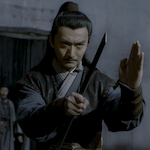 THE SWORD IDENTITY is a 2011 period martial arts movie that’s the debut of writer/director Xu Haofeng, based on his own book. He’s directed a few more movies since then and notably wrote THE GRANDMASTER for Wong Kar Wai. I adore that movie and all its poetic musings about kung fu styles and secret moves, so I tried this one out and, though it’s in many ways THE GRANDMASTER’s stylistic opposite, I was not disappointed.
THE SWORD IDENTITY is a 2011 period martial arts movie that’s the debut of writer/director Xu Haofeng, based on his own book. He’s directed a few more movies since then and notably wrote THE GRANDMASTER for Wong Kar Wai. I adore that movie and all its poetic musings about kung fu styles and secret moves, so I tried this one out and, though it’s in many ways THE GRANDMASTER’s stylistic opposite, I was not disappointed.
From the title I guessed it would be kind of a sword forensics thing. Maybe someone recognizes a famous sword in someone’s hand and has to learn of its history to identify the person or solve some mystery about them. It could also just be Jason Bourne with swords, which I would also be down for. It’s closer to the first option. It’s sort of about a sword causing a mistaken identity. When two men come into the town of Guancheng carrying swords of an unusual design they are mistaken for Japanese pirates, causing a citywide ruckus.
I didn’t follow what they were up to at first. They wear ragged hats and robes like peasants, and they work their way through this area where uniformed men attack with spears and then arrows. But they’re very good and are able to dispatch most of them in a few quick, precise moves. I thought maybe they were just some cool working class guys who hate cops. We can all get behind that. But soon we learn they’re just following the 200 year old rule that if someone wishes to introduce a new martial arts style to Guancheng they have to fight their way through four gates guarded by the four martial arts families of the town. If they succeed they will be allowed to establish a school.
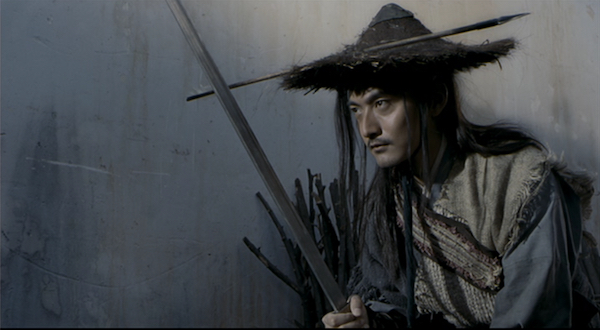
Our lead swordsman (Song Yang, THE EIGHT HUNDRED) is referred to and credited as “General Qi’s last body guard,” but is named Liang Henlu according to plot summaries. His partner (Yao Wei-Ping I believe) is injured and captured and then Liang is cornered by archers led by Master Qie (Ma Jun, THE UNFORGIVABLE), who seems to be the head of all four schools. When Master Qie calls Liang and his sword Japanese, Liang is offended, saying he uses this sword against the Japanese and demanding his right to compete to open a school. Master Qie refuses and, in what he believes is a merciful offer, says that he can go if he breaks the sword. Instead, Liang feints and flees.
The masters have the partner’s sword, though, and they examine it. The weapon, much like the movie itself, is beautiful in its simplicity. No curves or engravings, no fancy hilt, just a long, straight rectangle, angled at the end. We will learn that it was created by the great General Qi, inspired by Japanese swords, but longer, and only sharpened at the end so that the edges can be used to block weapons and to grip in situations where a shorter blade is more appropriate. That’s one of the things I love about this movie: lots of admiration of weapons, discussion of technique, and a few times even voiceovers of peoples’ inner monologues describing their chess-like battle strategies step by step.
“What an evil sword,” one of the masters says. But Master Qie hits it against his wrist, listens to its vibrations, and concludes, “It’s a great sword. It’s too bad.”
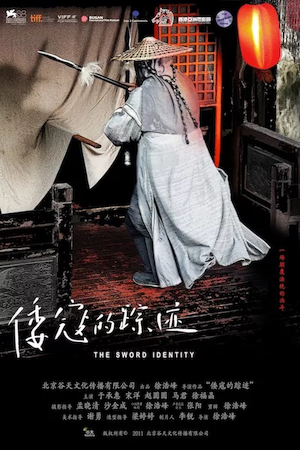 Liang ends up hiding in a tiny boat tied to a dock. It’s the home of four nomadic dancers (referred to as “gypsies,” which I know is considered an offensive term, but they don’t appear to be Romani) and he’s paid one of them, Sai Lan (Xu Fujing) to dance for him. She’s annoyed partly because she wants to go watch a kung fu competition in town with the others and partly because he’s not even watching her – he claims he’s testing her strength.
Liang ends up hiding in a tiny boat tied to a dock. It’s the home of four nomadic dancers (referred to as “gypsies,” which I know is considered an offensive term, but they don’t appear to be Romani) and he’s paid one of them, Sai Lan (Xu Fujing) to dance for him. She’s annoyed partly because she wants to go watch a kung fu competition in town with the others and partly because he’s not even watching her – he claims he’s testing her strength.
The reason Liang and his partner came to town is that they’re the last remaining warriors who know General Qi’s methods, which they believe should be passed on for the good of their countrymen. Liang begins teaching them right here with Sai Lan, after he’s been tracked to the boat and surrounded. In one of the movie’s best gimmicks, he convinces her to try out part of the “Sword and Shadow” technique – she must hold onto a wooden rod, close her eyes, and swing up when she hears another weapon making contact with it.
So here are the Masters and everyone in town sitting in chairs attentively watching a wooden pole protruding from a curtain, as various great warriors slowly approach thinking they’re going to attack a Japanese pirate who is actually not Japanese or a pirate and who actually snuck out the back already. And his technique still defeats every one of them!
There’s another main character, Qiu Dongyue, a.k.a. Brother Qiu (Yu Chenghui, SHAOLIN TEMPLE), who was the head of the four schools before Master Qie, but he decided to quit and go off to the mountains. He has the second line of dialogue in the movie. A guys asks him “Will you be going to the mountains to hunt?” and he says, “To be alone.”
That’s some cool broody loner shit that’s sadder when you understand that he abandoned his life and fortune because he found out his wife (Zhao Yuanyuan) was cheating on him. Master Qie doesn’t understand why he didn’t kill his wife and her lover for that. I don’t want to give Brother Qiu toomuch credit for the simple act of not being a cold blooded murderer, but let’s give him a gold star or something for being cognizant of the fact that he’s a very old man and she’s a young woman married off to him and she was never gonna be happy. He doesn’t seem to blame her, he just feels inadequate. When he decides he needs to come down from the mountain to help because “a Japanese” is in town he first paints his mustache black.
He’s cool though because he’s good at sword identifying. He sees what’s going on with the wooden pole and explains that because his main weapon is the spear he’s familiar with “rodwork,” and knows that General Qi trained his soldiers on rods before he gave them swords because he figured out from the way Japanese soldiers held their swords that their technique evolved from rodwork.
Another major character who’s more on the comical side is the leader of the anti-pirate army, who laments that he’s almost 50 but still has to wear “paper armor.” He thinks he’ll capture Liang and earn metal armor; instead Liang bests him and forces him and his troops to march around in the river. When he tells Liang he’s worried about his armor warping because it’s not metal, Liang is confused and explains why paper paste is better. “I’d prefer metal,” the guy says. He wants the prestige of metal armor even if it’s not as good. It’s another example of people stubbornly sticking to old ways to their own detriment.
In the end, General Qi’s swordsmen are finally offered their competition, in which they will take on Master Qie and Brother Qiu. We get some of the good weaponry detail I like when Master Qie talks about his bamboo spear that he pours boiling oil on because it makes it not break easily against metal. He’s excited to bust out a heavy spear for the first time in forever – no one has been worthy of it since Brother Qiu went to the mountains. There’s a great moment when Master Qie actually acknowledges that Brother Qiu and Liang are the best in this fight. “Your skills are poor and I am injured,” he says to Liang’s partner. “We should stop and let the real masters continue. Stepping aside is a virtue.” That guy seemed like an asshole at the beginning but I kind of liked him by the end.
Like THE GRANDMASTER, this is about the importance of both tradition and innovation. It’s about not letting the past of General Qi’s style die but that’s not just looking back, it also means getting people to adapt to a sword style that’s new to them. To stop resisting progress. Everyone is so suspicious of anything Japanese that they refuse to learn from them. In the end, Brother Qiu’s mastery wins the duel, but he also acknowledges the legitimacy of Liang’s sword. And for Liang it’s not about the ego, it’s about the idea. So it’s comforting for him to hear “You lost on the basis of skill. Not the sword.”
I’m going to be honest: I don’t think most people would enjoy this movie as much as I did. In fact I know they wouldn’t, because most of the reviews I saw were pretty mixed or negative. I found one by a martial artist who praised the movie as realistic, but that’s not important to me (and the same guy goes on to say THE GRANDMASTER is ruined by being “too arty”, which I couldn’t disagree with more).
But I loved THE SWORD IDENTITY’s discussions about the philosophies of martial arts, set against the beauty of simplicity and stillness. It turns out I am open to fights that (until the final duel) don’t last much longer than quick draw battles. These are Masters, so their fights are over in just a few moves. I generally prefer long and complicated fights, but to me the way it’s done here is very original and effective. Admittedly there are a few parts where the weapons do something in closeup that I couldn’t follow, but mostly the action is very clear, precise, with lots of attention to footwork. Careful positioning and feeling out of the situation to be in the exact right place and posture before striking. And the compositions and camera moves seem as disciplined and strategic as the combat.
It also just has a beautiful and distinct look. I have evidence:
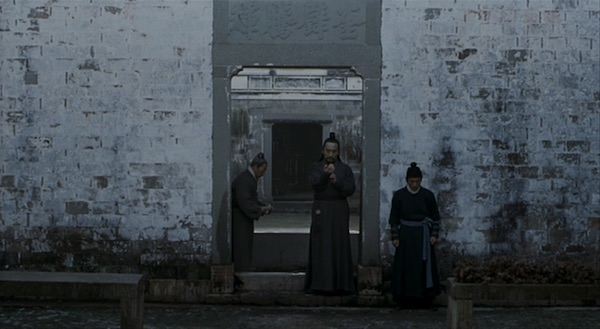
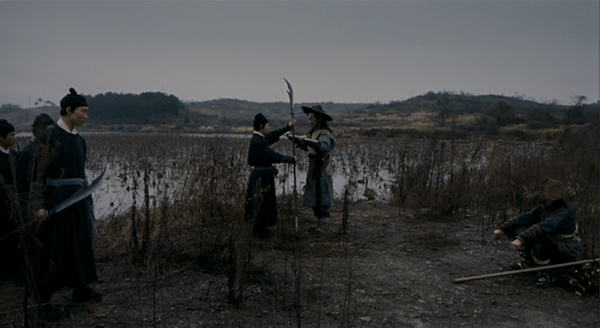
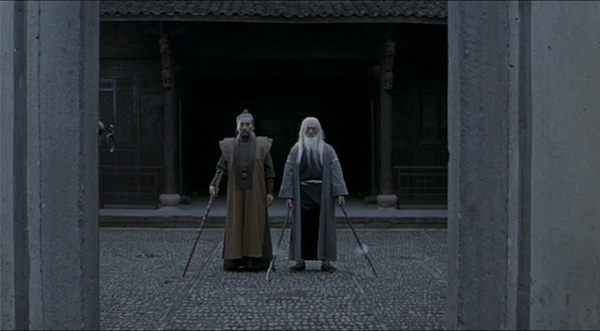
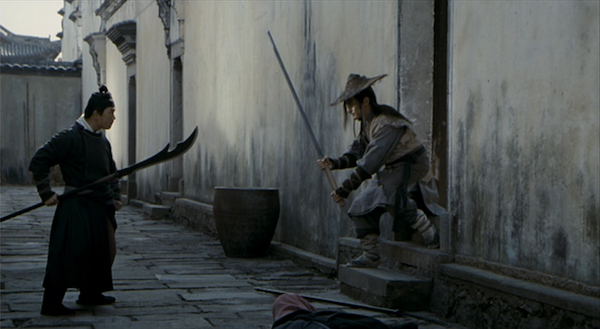
Xu is also listed as producer, editor and martial arts director. According to a biography on IMDb, he started studying the bare handed martial arts style Xingyi Quan as a teenager, attended Beijing Film Academy, then apprenticed with two martial arts masters and decided to write a biographical novel about one of them – The Bygone Kung Fu World. His second novel Monk Comes Down the Mountain was a bestseller and several years later was adapted into a movie by Chen Kaige, finally giving him entry to the industry he went to school for. So he brings an interesting combination of knowledge, skills and interests to martial arts filmmaking. I’ll definitely check out his other ones.
Thanks to Christian V (@GenreFilmAddict) and the Michael Wong Gifs account (@Wonggifs) on Twitter – I think it was one of their threads about the films of Xu Haofeng that inspired me to check this out.


























February 16th, 2022 at 2:28 pm
I’m glad I read the review before I jumped ahead and made my hilarious THE SWORD SUPREMACY and JASON SWORD jokes.